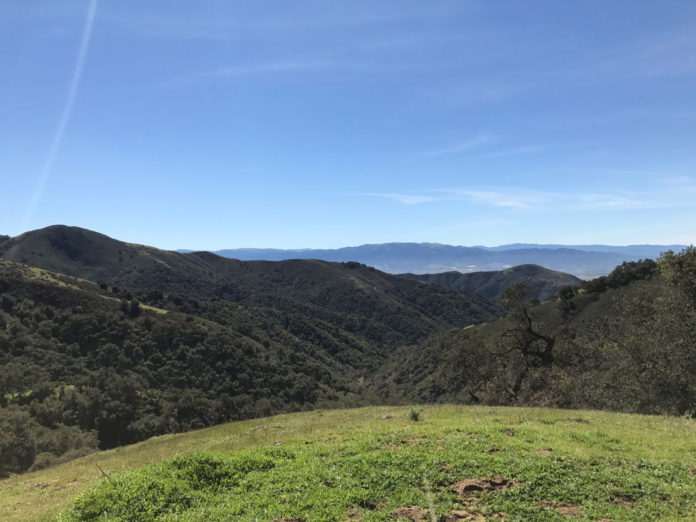
The 9,400-acre Silacci Ranch—a sprawling landscape that stretches from the Salinas Valley floor to the peaks of the Gabilan Range—will be protected forever from suburban sprawl following a recent agreement between the property owner and a California land trust.
The Silacci Ranch is located in Monterey and San Benito counties, and abuts the City of Salinas. The Silacci family has partnered with the Rangeland Trust to permanently conserve the ranch while continuing to conduct ranching and farming operations on the land, says a press release from the Rangeland Trust.
The conservation was completed with funding from the California Wildlife Conservation Board (WCB), the California Strategic Growth Council’s Sustainable Agricultural Lands Conservation (SALC) Program in collaboration with the California Department of Conservation, the National Fish and Wildlife Foundation (NFWF) through Walmart’s Acres for America program, and a donation by the Silacci family.
“We’re happy to see Rangeland Trust use a grant from our Sustainable Agricultural Lands Conservation Program to permanently protect Silacci Ranch from suburban sprawl,” said Lynn von Koch-Liebert, executive director of the Strategic Growth Council.
Five generations of the Silacci family have been raised on the land, and like other ranchers, they have faced challenges that have made it increasingly difficult to continue ranching, according to the Rangeland Trust. With struggles such as squeezed profit margins, increased fuel and labor costs, drought and water restrictions, stringent policies and other challenges, ranchers are often pressured to find alternative forms of income to supplement their business operations.
By partnering with the Rangeland Trust to conserve the property, the family has opted to safeguard their ranch from future uncertainties and ensure that their land and operations will remain viable for generations to come.
“While it is a privilege, working the land is difficult and hard work while balancing taxes, regulations and climate change, and (these factors) present substantial financial challenges,” Kevin Silacci, co-manager of the ranch, said. “By partnering with the California Rangeland Trust, we hope to help conserve the land in its natural state while providing an avenue for our children to keep the legacy in the family for future generations.”
The Silacci Ranch consists of prime farmland, productive rangeland, streams and riparian habitat, says the trust. The diverse topography serves as vital habitat for a variety of plant and animal species, including many special-status species such as the golden eagle, California tiger salamander, Pinnacles buckwheat and California false lupine.
Preventing the ranch from conversion to more intensive uses also contributes to climate resiliency by avoiding future increases in greenhouse gas emissions, allowing the ranch to continue as a natural carbon sink and giving species room to move to higher elevations or cooler riparian areas as temperatures increase, says the release.
“This conservation easement protects a variety of plants and animals that live in the property’s extensive oak woodlands, riparian habitat, coastal scrub and grasslands,” said Rebecca Fris, WCB Acting Executive Director. “We are happy to be part of the multi-agency partnership to protect wildlife habitat, open space, and grazing while reducing greenhouse gas emissions.
California is currently on track to lose another 797,400 acres of farm and ranch land to development and conversion by 2040, according to the Rangeland Trust. When working lands are subdivided and converted to other uses, this conversion threatens the region’s wildlife habitat and natural resources. With the recently completed conservation easement, the Silacci Ranch will remain as a working landscape and contiguous block of habitat for wildlife in perpetuity.
“Silacci Ranch is a great example of well-managed land that provides both economic and environmental benefits,” Department of Conservation Director David Shabazian said. “Sustainable rural economies and protection of our natural working lands are both complementary and essential in achieving California’s climate goals.”
Under the terms of the conservation easement, the Silacci family will continue to own and manage the land, just as they always have, explained the trust. They will continue to prioritize responsible management by seasonally grazing most of their property with cattle to fend off invasive species and mitigate the potential wildfire risks; and by rotationally farming strawberries, bush berries and leafy green vegetables on roughly 300 acres of the valley floor.
“We are honored to be partnering with the Silacci family and other agencies to protect this ranch,” Rangeland Trust CEO Michael Delbar stated. “This land not only serves as a physical reminder of the family’s long legacy, it also benefits all Californians by providing local, quality food, clean air, fresh water and valuable wildlife habitat.”









